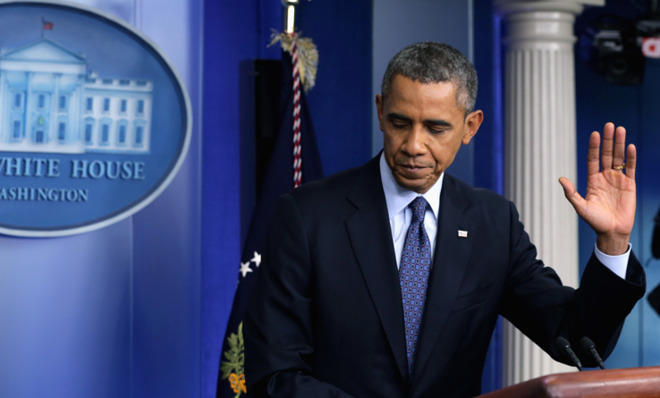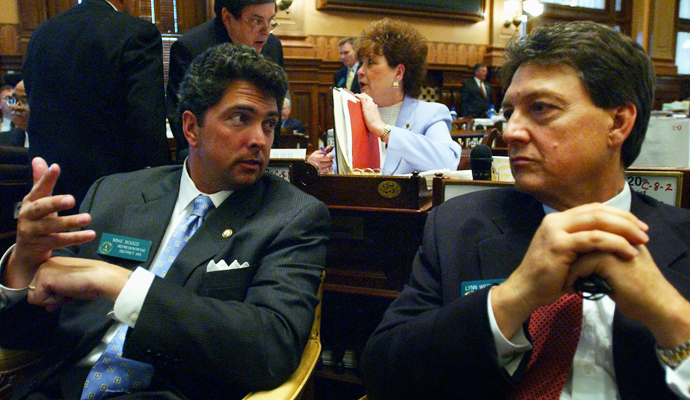Hey, liberals: Stop fighting Obama on judges
You're only hurting yourselves

A free daily email with the biggest news stories of the day – and the best features from TheWeek.com
You are now subscribed
Your newsletter sign-up was successful
Civil rights and abortion rights groups are going to the mat to stop President Obama's nomination of Michael Boggs to be a federal District Court judge in Georgia. They sincerely think they are putting ideals above partisan loyalties. But in fact, they are myopically undercutting their own agenda, as well as holding Boggs to unfair standards.
Boggs' nomination is part of a seven-judge deal struck with the two Republican senators from Georgia who had been exploiting a procedure that gives senators informal veto power over judicial nominees from their states. After two years of delays, the Georgians agreed to back two of Obama's higher-level appellate judge nominations plus one district-level judge, if they were linked to four district-level picks of their preference.
Groups such as NARAL Pro-Choice America and the Leadership Conference on Civil and Human Rights are trying to scuttle the deal based on Boggs' 2001-2004 record as a state legislator, when he supported legislation to restrict abortion access and keep the Confederate symbol on the state flag.
The Week
Escape your echo chamber. Get the facts behind the news, plus analysis from multiple perspectives.

Sign up for The Week's Free Newsletters
From our morning news briefing to a weekly Good News Newsletter, get the best of The Week delivered directly to your inbox.
From our morning news briefing to a weekly Good News Newsletter, get the best of The Week delivered directly to your inbox.
Sounds awful, right? So why should liberals stand down and swallow this judicial nomination, along with the three other Republican picks? Here are five reasons why:
1. Defeating Boggs is worse for liberals than supporting him
Boggs' nomination is part of an "all-or-nothing" package, so defeating Boggs means defeating all seven judges in the compromise. The prize for torpedoing the deal would be seven vacancies that may not be filled until a Republican becomes president.
In other words, seven worse judges.
A free daily email with the biggest news stories of the day – and the best features from TheWeek.com
Even if Boggs was a bad a judge as one could imagine, he'd only be one bad judge, not seven. But we have no reason to assume Boggs is that bad.
2. Boggs has been a non-controversial state judge for the last 10 years

The case against Boggs is based on his conservative stances during his four years as a legislator. As the president of NARAL said of Boggs, "He never heard a case on our issues, so we have nothing to go on but his legislative record."
That's weak sauce. The question should not be about his personal ideology and political positions, but his judicial philosophy, and whether he'll be able to separate his personal views from his rulings. We have a 10-year record in which to find out if he is an activist judge, and you don't need cases on "our issues" to determine that. If his strongest opponents can't come up with a single example of judicial activism, that's telling.
Of course, if Boggs' votes in favor of the Confederate symbol translated into a bigoted approach to the judiciary, that would be disqualifying. But instead, he pioneered the effort to loosen the state's overly strict sentencing laws and give judges more discretion. Considering the incarceration rate for African-Americans in Georgia — like the rest of the country — is more than triple that of whites, Boggs work in sentencing reform seems more relevant to his views on impartial justice than his votes for a flag.
3. Plus, sometimes good people cast awful votes
Sen. Paul Wellstone (D-Minn.) voted for the anti-gay Defense of Marriage Act in 1996, because at the time any other vote would have been political suicide. Lyndon Johnson opposed civil rights legislation for 20 years, reflecting his constituents' racist views, before switching gears in 1957. Rep. Dennis Kucinich (D-Ohio) faithfully kept an anti-abortion voting record, in line with his heavily Catholic Cleveland district, before launching his first presidential bid.
These are all deeply liberal people who occasionally made expedient political decisions, and liberals generally did not hold it against them, because they appreciated the context in which those choices were made.
Whether Boggs' past controversial stances were expedient, or sincere views no longer held, one can never truly know. The point is: The mere casting of the vote does not tell all.
4. Obama has already gotten hundreds of Democratic judges confirmed
Slate's Jamelle Bouie recently slammed the deal, arguing: "If it goes through, Republicans get four lifetime appointments to the federal judiciary, putting a stamp on the courts at a time when Obama should have the prerogative."
But Obama is not sacrificing his stamp on the judiciary. As of Wednesday, Obama has gotten 254 judges confirmed. If this package goes through, that number will hit 261, overtaking Bill Clinton's tally at the same point in his second-term. Obama already surpassed George W. Bush's pace last month. And as of November, Democrat-appointed judges have overtaken Republicans as the majority of the federal judiciary.
And Obama has more room to put an even stronger stamp on the judiciary. Not counting the seven Georgia nominees, Obama has 29 more judicial nominations in the pipeline. Another 58 vacancies are waiting to be filled. With the Senate no longer allowing judicial filibusters, nominations are moving at a faster clip. Throwing Republicans this small bone to keep the process moving doesn't change the trajectory.
5. And do you really think Barack Obama is going to nominate a racist?
Finally, let's use some common sense. Barack Obama is America's first black president. He was a constitutional law professor. He nominated stellar picks to the U.S. Supreme Court. He is not an idiot.
If anyone has earned the benefit of the doubt when it comes to judicial picks, it is he.
Update: Today, one of the Republican senators who engineered the deal clarified that: "Our deal was that the committee would hear all seven of them and the committee would vote whichever way they vote. Beyond that, there was no deal." So contrary to what I originally wrote, senators could vote against Boggs without the collateral damage of six other vacancies. The rest of my argument still stands. I would further argue that future cooperation from Republican senators on home-state nominations would be jeopardized if the president proved unable to deliver Democratic votes, which could slow the progress he has made to date on judicial nominations.
Bill Scher is the executive editor of LiberalOasis.com and the online campaign manager at Campaign for America's Future. He is the author of Wait! Don't Move To Canada!: A Stay-and-Fight Strategy to Win Back America, a regular contributor to Bloggingheads.tv and host of the LiberalOasis Radio Show weekly podcast.
-
 One great cookbook: Joshua McFadden’s ‘Six Seasons of Pasta’
One great cookbook: Joshua McFadden’s ‘Six Seasons of Pasta’the week recommends The pasta you know and love. But ever so much better.
-
 Scientists are worried about amoebas
Scientists are worried about amoebasUnder the radar Small and very mighty
-
 Buddhist monks’ US walk for peace
Buddhist monks’ US walk for peaceUnder the Radar Crowds have turned out on the roads from California to Washington and ‘millions are finding hope in their journey’
-
 The billionaires’ wealth tax: a catastrophe for California?
The billionaires’ wealth tax: a catastrophe for California?Talking Point Peter Thiel and Larry Page preparing to change state residency
-
 Bari Weiss’ ‘60 Minutes’ scandal is about more than one report
Bari Weiss’ ‘60 Minutes’ scandal is about more than one reportIN THE SPOTLIGHT By blocking an approved segment on a controversial prison holding US deportees in El Salvador, the editor-in-chief of CBS News has become the main story
-
 Has Zohran Mamdani shown the Democrats how to win again?
Has Zohran Mamdani shown the Democrats how to win again?Today’s Big Question New York City mayoral election touted as victory for left-wing populists but moderate centrist wins elsewhere present more complex path for Democratic Party
-
 Millions turn out for anti-Trump ‘No Kings’ rallies
Millions turn out for anti-Trump ‘No Kings’ ralliesSpeed Read An estimated 7 million people participated, 2 million more than at the first ‘No Kings’ protest in June
-
 Ghislaine Maxwell: angling for a Trump pardon
Ghislaine Maxwell: angling for a Trump pardonTalking Point Convicted sex trafficker's testimony could shed new light on president's links to Jeffrey Epstein
-
 The last words and final moments of 40 presidents
The last words and final moments of 40 presidentsThe Explainer Some are eloquent quotes worthy of the holders of the highest office in the nation, and others... aren't
-
 The JFK files: the truth at last?
The JFK files: the truth at last?In The Spotlight More than 64,000 previously classified documents relating the 1963 assassination of John F. Kennedy have been released by the Trump administration
-
 'Seriously, not literally': how should the world take Donald Trump?
'Seriously, not literally': how should the world take Donald Trump?Today's big question White House rhetoric and reality look likely to become increasingly blurred